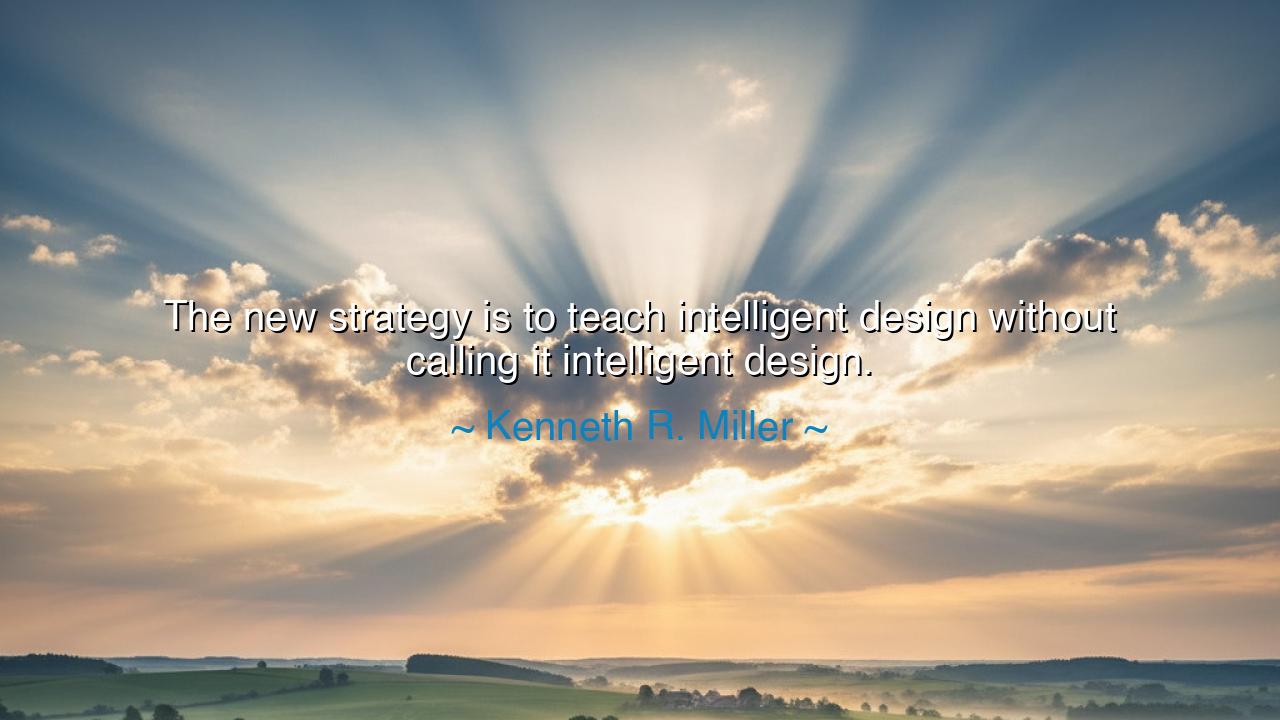
The new strategy is to teach intelligent design without calling






The words of Kenneth R. Miller—“The new strategy is to teach intelligent design without calling it intelligent design”—speak with the sharpness of truth revealed through struggle. Miller, a biologist and devout believer, stood at the crossroads of science and faith, defending the integrity of reason in an age when the boundaries between knowledge and belief were being cunningly blurred. His statement arose during the great public debate over the teaching of evolution and intelligent design in American schools—a battle not only of theories, but of worldviews. In these few words, Miller exposes a strategy cloaked in subtlety: to reintroduce theology into science, not through open argument, but through disguise.
To understand the weight of this quote, one must look to its origin in the early twenty-first century, when advocates of intelligent design sought to reframe creationism in scientific language. After U.S. courts had ruled that teaching creationism violated the separation of church and state, its proponents returned with a new face—speaking not of “God,” but of a “designer,” not of “miracle,” but of “complexity.” Yet beneath the new garments, the same old spirit stirred: a longing to replace the light of inquiry with the comfort of certainty. It was this hidden transformation that Miller denounced when he said, “The new strategy is to teach intelligent design without calling it intelligent design.” He saw, as the wise often do, that truth concealed is more dangerous than falsehood declared.
Throughout the ages, the tension between knowledge and belief, between revelation and discovery, has shaped the destiny of humankind. From Galileo, forced to kneel before the Church for daring to say the Earth moved, to Darwin, whose Origin of Species sent tremors through the conscience of the nineteenth century, we have always wrestled with the question: shall truth be sought, or shall it be protected? Miller’s warning is not against faith itself, but against deception in the service of conviction. The ancients would have called this hubris—the arrogance of thinking one may bend truth to serve one’s own ends. For when truth is veiled, even by noble intent, darkness grows in its place.
Consider the story of Galileo Galilei, that ancient seeker who lifted his telescope to the heavens and saw moons circling Jupiter—proof that not all revolved around the Earth. His findings threatened the dogma of his time, for they dared to contradict what was said to be divinely ordained. When the Church forbade his teaching, some tried to hide their theology beneath the language of reason, to disguise divine authority as empirical fact. But truth cannot live beneath disguise; it demands open air. Galileo’s courage—his refusal to let faith masquerade as science—became a beacon for all who came after him, including thinkers like Miller, who defend the sanctity of knowledge with both humility and strength.
Miller’s words carry another layer of meaning, too. They remind us that truth must always guard itself against manipulation, not only in science but in all realms of thought. When language is twisted, when meanings are hidden, when people cloak their intentions in borrowed words, corruption begins to spread silently, like roots beneath the ground. The wise must therefore learn to see through disguise—to recognize when arguments are built not upon reason, but upon persuasion dressed as truth. To “teach intelligent design without calling it intelligent design” is to trade sincerity for strategy, and the cost of such deceit is the erosion of trust itself.
And yet, there is no hatred in Miller’s warning. His voice does not condemn belief, but calls for integrity—for the honest meeting of science and spirit without the masks of subterfuge. He, like the philosophers of old, seeks harmony between the heart and the mind. Faith and science, he teaches, need not be enemies, but they must remain distinct in their domains. Faith may speak of purpose; science must speak of process. To blur the two is to dishonor both. The true harmony of wisdom lies not in mixing opposites, but in respecting their sacred boundaries.
Let this, then, be the teaching: never conceal belief as knowledge, nor disguise ideology as truth. Whether in science, politics, or the soul’s own reasoning, integrity is the pillar upon which all understanding rests. Speak plainly, even when it costs you comfort; defend truth, even when deception seems easier. For falsehoods whispered in the name of good intentions can do greater harm than open lies. The ancients taught that the first duty of a seeker is honesty—with oneself, and with the world.
Thus, from Miller’s words we draw a timeless lesson: truth must stand in the light. Whatever we teach, whatever we build, let it be with transparency and reverence for what is real. To design ideas is noble; to disguise them is perilous. For as long as humanity has sought wisdom, the path to enlightenment has required courage—the courage to call things by their true names.






AAdministratorAdministrator
Welcome, honored guests. Please leave a comment, we will respond soon